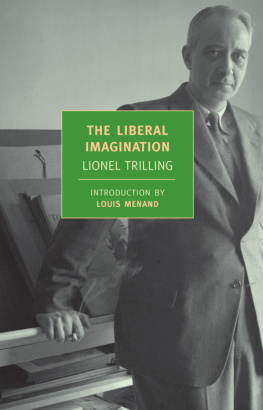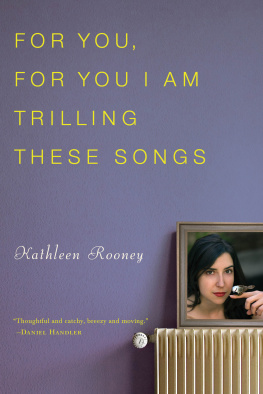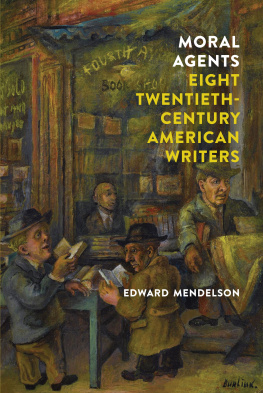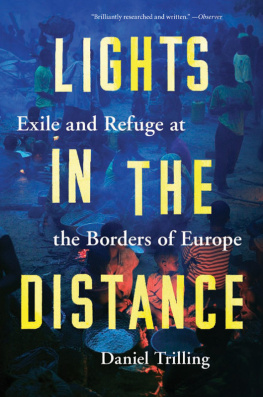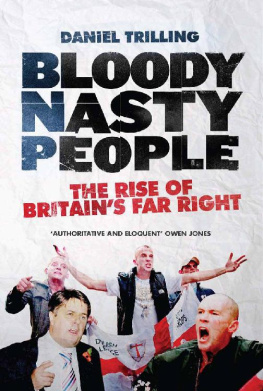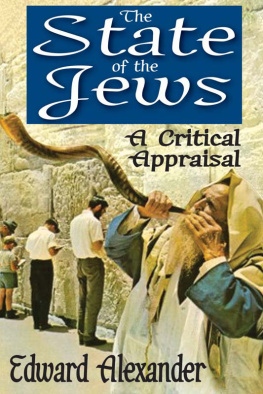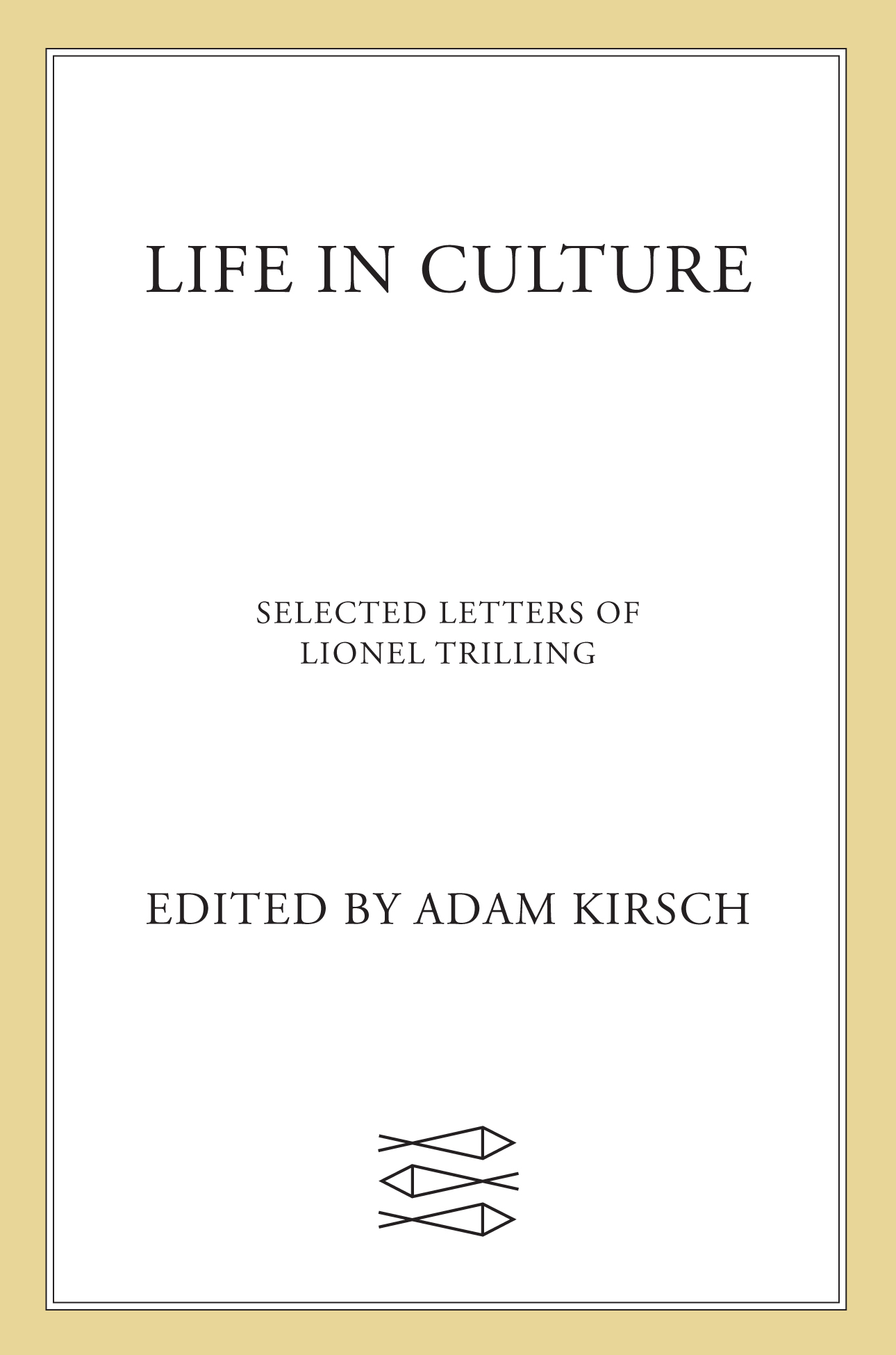Contents
Guide
Pagebreaks of the print version

The author and publisher have provided this e-book to you for your personal use only. You may not make this e-book publicly available in any way. Copyright infringement is against the law. If you believe the copy of this e-book you are reading infringes on the authors copyright, please notify the publisher at: us.macmillanusa.com/piracy.
INTRODUCTION
LIONEL TRILLINGS LIFE IN CULTURE
It is rare for a literary critic to remain alive for readers decades after his deatheven rarer than for a novelist or a poet. Lionel Trilling (19051975) belonged to what Randall Jarrell called the age of criticism, a time when the analysis and judgment of texts had a prestige that is hard to imagine today. Many of the leading figures of that golden age appear in the correspondence collected in this volume, as Trillings friends, colleagues, or antagonists. But only a few of them are still in print today, and fewer still have the ability to inspire devotion or argument.
If Trilling is the exception, it is because his own position in the age of criticism was exceptional, even anomalous. He was not, like the New Critics Allen Tate and John Crowe Ransom, a close analyst of textual strategiesone reason why he seldom wrote about poetry. He was not a journalist-critic like Edmund Wilson and Alfred Kazin, helping to shape the publics taste for new books and writers. Nor was he, after his first book, a literary historian like Newton Arvin or Leon Edel.
Perhaps to describe Trilling as a literary critic at all, though inevitable, is somewhat misleading. (When the philosopher Etienne Gilson told him that he wasnt really a literary critic, Trilling responded with delight.) Really, he belonged to a different, though related, species: he was an intellectual, a thinker about society, politics, and ideas, who used literature as the medium of his investigations. Yet here, too, Trilling stands out from his contemporaries. Without a doubt, he was a charter member of the group known as the New York intellectualsthe writers, mostly first-generation American Jews, whose work filled the pages of Partisan Review and Commentary . He shared the eclectic approach of this group, as described by Irving Howe: The kind of essay they wrote was likely to be wide-ranging in reference, melding notions about literature and politics, sometimes announcing itself as a study of a writer or literary group but usually taut with a pressure to go beyond its subject, toward some encompassing moral or social observation.
Trilling, too, writes at what he famously called the bloody crossroads of literature and politics. When he discusses Orwells honesty, or Keatss affirmativeness, or Forsters rejection of greatness, he is describing literary qualities that are at the same time visions of life and society. Yet what Howe goes on to say about the prose style of the New York intellectualsthat it was nervous, strewn with knotty or flashy phrases, impatient with transitions and other concessions to dullness, calling attention to itself as a form or at least an outcrydoes not at all describe Trillings work. Rather, his style is grave or elaborately ironic, impersonal, and authoritative, owing much to the Victorian sages who were the subject of his early academic study.
One way of describing Trillings distinctive quality as a thinker and writer is to say that he was a hybrid of the twentieth-century radical intellectual and the nineteenth-century liberal moralist. This is why he was so acutely aware of the tensions that arose when liberalism evolved into radicalism, as it did for many American intellectuals in the 1930s and 1940s. Trillings only published novel, The Middle of the Journey , published in 1947, was a dramatization of this confrontation; his essay collection The Liberal Imagination , which followed three years later, analyzed the same issue, in texts ranging from Henry Jamess The Princess Casamassima to the Kinsey Report.
Trillings correspondence shows that the publication of these books marked a watershed in his life and career. Before them, he was a junior professor at Columbia and a respected member of the New York intelligentsia; after them, he became an intellectual celebrity and an academic grandee, with a national and international reputation. The last twenty-five years of his life saw him accumulate numerous honors, as he emerged as a kind of emblem of the life of the mind. When Trilling died, his obituary was on the front page of The New York Times , and it spoke of him in reverential terms: his criticism was a moral function, a search for those qualities by which every age in its turn measured the virtuous man and the virtuous society.
It is in this large and profound sense that Lionel Trillings life can be described as a life in culture. It is not simply that Trilling was in culture as a field, the way other people are in business or in medicine, though it is true that he worked in several areas of the culture industry, not just as a teacher and writer, but as a participant in radio and TV discussions and as the editor of a subscription book club. Rather, his thought was an exploration of what it means to live in cultureas a set of assumptions and values governing individual life, and a set of transactions in which human potentialities are gained and lost.
This is the tragic, Freudian sense in which Trilling used the phrase in his essay Art and Neurosis: We come then to a remarkable paradox: we are all ill, but we are ill in the service of health, or ill in the service of life, or, at the very least, ill in the service of life-in-culture. To be cultured, or civilized, or humane, is for Trilling an ambiguous proposition. He admires the energy of modern literature as a destructive, antinomian force. These structures, he writes of the modernist masterpieces in On the Teaching of Modern Literature, were not pyramids or triumphal arches, they were manifestly contrived not to be static and commemorative but mobile and aggressive, and one does not describe a quinquereme or a howitzer or a tank without estimating how much damage it can do.
Yet Trilling is also aware that civilization cannot be damaged without cost. Many of his best essays attempt to measure what is gained and lost when we become modern in literature and thought. When Trilling wonders why readers do not enjoy Mansfield Park as much as Emma , or when he compares the wise passiveness of Wordsworth with the spiritual sensibility of rabbinic Judaism, he is not asking strictly literary questions; rather, he is inviting the reader to reflect on the decline of traditional systems of ethics and values. My own interests, he wrote, lead me to see literary situations as cultural situations, and cultural situations as great elaborate fights about moral issues, and moral issues as having something to do with gratuitously chosen images of personal being.
As this suggests, Trillings exploration of literary and cultural questions would not be so dramatic and compelling if they were not questions he asked himself as well. He was acutely aware of the irony involved in becoming an icon of culture, because he knew well that life in culture comes at a cost. In his own life, he experienced this cost as the sacrifice of creative work for critical writing, and of personal experience for respectability and achievement. Indeed, Trillings life was seldom outwardly dramatic. Born in New York in 1905, he lived in the city for his entire life, with the exception of an early year spent teaching at the University of Wisconsin and a few later years at Oxford. His life in New York revolved around a single institution, Columbia University, where he was an undergraduate in the early 1920s, a graduate student in the 1930s, and a teacher for four decades, until he retired with the highest rank of University Professor. He was married to Diana Trilling in 1929 and remained married to her until his death in 1975. His days were filled with teaching, reading, thinking, and writingquiet, sometimes invisible activities.


